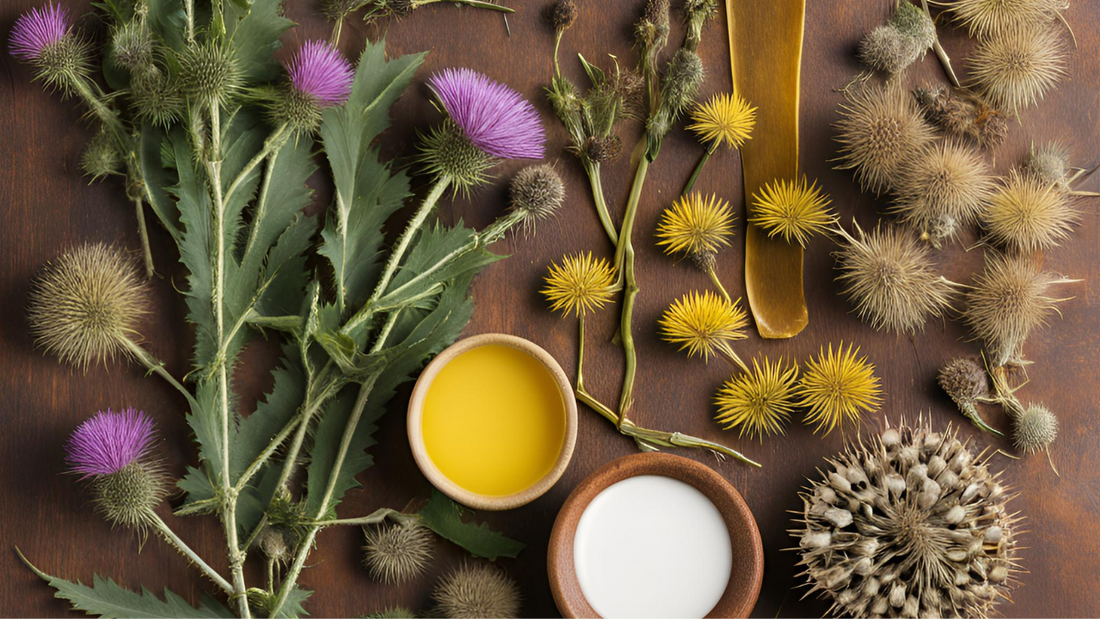A Guide to Alterative Herbs: Support Your Wellness Naturally

Share
What Are Alterative Herbs?
Alterative herbs are plants traditionally used to support the body’s natural waste removal processes and promote balance. They are believed to work by supporting organs like the liver, kidneys, skin, and lymphatic system, which help eliminate waste and maintain health. Unlike harsh detox methods, alteratives act gently, making them a staple in holistic wellness.
Historically, herbalists used alteratives to “cleanse” the body, but modern science focuses on their role in supporting the body’s natural functions. Preliminary research suggests some alteratives may support liver health or provide antioxidants, contributing to overall wellness, though more studies are needed.
To learn more about herbal categories, read our informational blog, Herbal Actions: A Complete Guide to Using Herbs Effectively (#).
How Alterative Herbs Support Wellness
Alterative herbs may support wellness in several ways, based on traditional use and preliminary research. Here are some potential benefits, though effects vary by individual and more research is needed:
-
Supporting Liver Health: Some herbs are traditionally used to support liver function, and early studies suggest they may aid in metabolic processes.
-
Promoting Lymphatic Health: Certain herbs may support healthy lymphatic function, according to traditional use.
-
Providing Nutrients: Many alteratives are rich in vitamins and minerals, supporting general health.
-
Reducing Oxidative Stress: Some herbs contain antioxidants, which preliminary research suggests may help protect cells from damage.
Always consult a healthcare provider to ensure herbs align with your health needs, as results vary.
Top Alterative Herbs and Their Benefits
Below are 10 well-known alterative herbs, their potential benefits, and the science behind them. Note: The benefits listed are based on traditional use and available research, but results vary. These herbs are not intended to diagnose, treat, or cure any condition. Consult a healthcare provider before use.
-
Burdock Root (Arctium lappa)
Burdock root, also known as “gobo,” is rich in antioxidants. A 2022 study suggests it may reduce oxidative stress in cells, which could support skin health as part of a holistic routine, though more research is needed to confirm its effectiveness for conditions like eczema (Reference 2). It’s also traditionally used to support digestion.
Zuma Nutrition’s Liver Cleanse & Support Tonic includes burdock root for its wellness benefits. -
Red Clover (Trifolium pratense)
Red clover contains isoflavones, which may support hormonal balance and skin health. A 2005 study suggested it may improve skin elasticity in some individuals, though more research is needed (Reference 3). It’s often used for general wellness.
-
Nettle (Urtica dioica)
Nettle is packed with nutrients like iron and vitamin C, supporting overall health. Research suggests it may reduce inflammation and support urinary health, based on preliminary studies (Reference 5). Traditionally, it’s used to promote vitality.
Zuma Nutrition’s Male Hormone & Prostate Support Formula includes nettle root.
-
Dandelion (Taraxacum officinale)
Dandelion root may support liver function by promoting bile flow, aiding digestion, according to a 2021 study (Reference 6). As a natural diuretic, it may support fluid balance while providing potassium, per research (Reference 7).
-
Yellow Dock (Rumex crispus)
Yellow dock is traditionally used to support digestion, but scientific evidence is limited, and more research is needed (Reference 8). It’s also thought to aid iron absorption, supporting energy levels.
-
Cleavers (Galium aparine)
Cleavers may support lymphatic health and fluid balance, per traditional use and preliminary research, though evidence is limited (Reference 9). It’s often used to promote clear skin.
Zuma Nutrition’s Lymphatic Cleanse Tonic includes cleavers.
-
Milk Thistle (Silybum marianum)
Milk thistle contains silymarin, which may support liver health by protecting cells from oxidative stress, per a 2007 review (Reference 10). It’s commonly used to promote liver function.
Zuma Nutrition’s Liver Cleanse & Support Tonic includes milk thistle.
-
Echinacea (Echinacea spp.)
Known for immune support, echinacea may also promote lymphatic flow, based on traditional use. It’s ideal for seasonal health support, though more research is needed.
Zuma Nutrition’s Candida Cleanse Tonic includes echinacea.
-
Oregon Grape (Mahonia aquifolium)
Oregon grape contains berberine, which may support digestion and skin health, per a 2024 study, though further studies are needed (Reference 11). It’s used to promote liver function.
Zuma Nutrition’s Candida Cleanse Tonic includes Oregon grape root.
-
Chaparral (Larrea tridentata)
Chaparral has antioxidant properties and is traditionally used to support skin and respiratory health. Due to potential risks, it should only be used under professional guidance.
How to Use Alterative Herbs Safely
Incorporating alterative herbs into your routine can be simple but requires care:
-
Herbal Teas: Try nettle or red clover tea for a gentle daily boost. Follow package instructions for brewing.
-
Tinctures or Capsules: Use products like Zuma Nutrition’s tonics for convenience. Follow label instructions. (Disclosure: We may earn a commission from purchases of Zuma Nutrition products.)
-
Culinary Use: Add burdock root to soups for nutrition and flavor.
-
Consult a Professional: Work with an herbalist or doctor to tailor herbs to your needs, especially if you’re pregnant, nursing, or on medication.
Safety Note: Herbs can interact with medications or cause side effects. Always start with small amounts and monitor your body’s response.